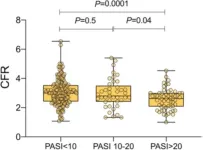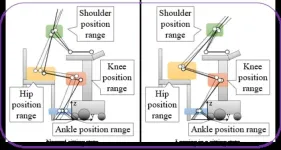(Press-News.org) As climate change accelerates, it is becoming increasingly important to study the impact of climate change on human health. A new thesis from the University of Gothenburg examines church records and historical weather data in the Nordic countries to show that the risk of dying from malaria was higher if the previous summer was a hot one.
The growing impact of climate change on human health is an acute global threat in the 21st century. The rise in certain types of extreme weather events is not only affecting individuals, but also putting ecosystems that are closely linked to our health under pressure.
“As the climate grows warmer, there is a risk of insect-borne diseases returning to areas from which they were previously eradicated. Malaria was prevalent in the Nordic countries up until the start of the 20th century, and we can learn from historical malaria outbreaks to improve resilience in the future,” says Tzu-Tung Chen, a doctoral student at the University of Gothenburg who has examined the link between weather conditions and malaria deaths in the Nordic countries in the pre-industrial era.
The impact of climate on mortality
The findings reveal that climate had a clear impact on both malaria transmission and mortality in Denmark, Sweden and Finland. Malaria outbreaks were able to be linked to warm summers in the preceding year, while higher all-cause mortality followed if the spring was cold. Precipitation played a lesser role in this context.
“The higher mortality rate after a cold spring may be due to people being less resilient as a result of food shortages when harvests failed. A warm summer in the previous year allowed more malaria-infected mosquitoes to hatch, which then overwintered indoors before starting to bite people the following year,” says Tzu-Tung Chen.
Parish registers
Tzu-Tung Chen established the link between malaria deaths and weather conditions by examining data on causes of death from church registers kept in each parish together with weather data for the period studied, 1749–1859. There was a clear link, although it is likely that other factors such as overcrowding also contributed to the variations in these complex connections.
“But at least 20 per cent of variations in malaria deaths can be explained by climate. Dying of malaria was quite common in this period. It is estimated that about 1–2 per cent of all deaths was caused by the mosquito-borne virus, often called ‘chills’ in church registers,” says Tzu-Tung Chen.
Several perspectives
The impact of a warmer climate in the Nordic countries on insect-borne diseases involves several factors. Firstly, there will be a larger area in the Nordic region where the environment becomes suitable for disease spreading insects; secondly, the season in which these insects are active and can spread the disease will be longer, and finally, the risk of seeing more infected cases may become higher.
“We are already seeing dengue fever, Zika virus and West Nile virus moving further north in Europe as the tiger mosquitoes that carry these diseases become established.”
END
A hot summer led to more malaria deaths the following year
2023-09-20
ELSE PRESS RELEASES FROM THIS DATE:
Shading the Great Barrier Reef from the sun might slow bleaching-induced coral decline
2023-09-20
Over the past two decades, coral reefs have declined at unprecedented rates. This is in part because of extreme weather events, which cause wide-spread coral bleaching, a process during which corals lose their color because of stressors, including changes in water temperature, light, or nutrient availability. One of the worst mass bleaching events occurred in 2016 and 2017 on the Great Barrier Reef, causing bleaching on 91% of the system’s reefs.
As frequency and severity of mass bleaching events are expected to increase in the future, researchers are looking for ways to protect corals from excessive radiation and temperatures. As part of the Cooling and Shading ...
New method makes microcombs ten times more efficient
2023-09-20
Microcombs can help us discover planets outside our solar system and track new diseases in our bodies. But current microcombs are inefficient and unable to reach their full potential. Now, researchers at Chalmers University of Technology in Sweden have scored a world first with their solution to make microcombs ten times more efficient. Their breakthrough opens the way to new discoveries in space and healthcare and paves the way for high-performance lasers in a range of other technologies.
Laser frequency ...
Over 50s with ADHD ‘overlooked’ for diagnosis and treatment, say experts
2023-09-20
Doctors urgently need better international guidance on treating attention deficit hyperactivity disorder (ADHD) in the over 50s, conclude world-leading experts reviewing current research on this increasing issue globally.
Published in the peer-reviewed journal Expert Review of Neurotherapeutics, the team’s findings highlight a ‘striking’ gap in knowledge about older people as existing guidelines focus on children and young adults.
“Our analysis concludes that better approaches are urgently required to screen and diagnose people aged from around age 50 to 55,” says lead author Dr Maja Dobrosavljevic ...
New evidence confirms patients with severe psoriasis are at a higher risk for heart disease
2023-09-20
Philadelphia, September 20, 2023 – In the largest study to date exploring the relationship between severe psoriasis and coronary microvascular dysfunction, researchers have found further evidence that patients with severe psoriasis are at higher cardiovascular risk. The results are published in the Journal of Investigative Dermatology, published by Elsevier.
Psoriasis is a chronic systemic immune-mediated inflammatory disease that affects 1-3% of the global population. In this study, a total of 503 patients with psoriasis, and without clinical cardiovascular disease, underwent transthoracic Doppler echocardiography to evaluate coronary microcirculation. ...
Google could play a big role in protecting the health of American children
2023-09-20
Applying Google’s own nutrition advertising policy to the US market would slash the number of products from the country’s top 25 food and beverage manufacturers that could be marketed to children online, according to new research from The George Institute for Global Health.
Published today in the American Journal of Preventive Medicine, the findings suggest the global company could play a significant role in improving the health of future generations by reducing their exposure to, and preference for, unhealthy foods and drinks.
Lead author Dr Elizabeth Dunford, Research ...
Should we screen all newborns for neurodevelopmental disorders?
2023-09-20
Expanding newborn screening (NBS) to include identifying genes associated with an increased risk for neurodevelopmental disorders (NDD) would cause more harm than good, according to an article published in Pediatrics. While some experts believe early identification of NDDs in the newborn period would provide an equitable way to flag and treat disabilities early, the authors of the new paper contend that broader genomic sequencing would worsen existing health disparities.
“The benefit of early genomic screening hinges upon the ability ...
Creation of training data to estimate the states of care robot users
2023-09-20
Overview
A research team led by Assistant Professor Mizuki Takeda from the Department of Mechanical Engineering, Toyohashi University of Technology, has developed a technique to generate training data for robots that operate based on estimations of the user’s state using machine learning. To date, some methods based on machine learning have been proposed to estimate the state of a robot users using candidate points for the position of the center of gravity. However, for such learning, training data corresponding to when the robot is used to support movements are required. The above-mentioned research ...
How good is Google Bard’s visual understanding? An empirical study on open challenges
2023-09-20
Bard, Google’s AI chatbot, based on LaMDA and later PaLM models, was launched with moderate success in March 2023 before expanding globally in May. It’s a generative AI that accepts prompts and performs text-based tasks like providing answers, and summaries, and creating various forms of text content. On 13 July 2023, Google Bard announced a major update which allowed providing images as inputs together with textual prompts. It was claimed that Bard can analyze visual content and provide a description (e.g., image captions) or answer questions using visual ...
Global obesity battle stymied: Deeper understanding is needed
2023-09-20
Prof. John Speakman from the Shenzhen Institute of Advanced Technology (SIAT) of the Chinese Academy of Sciences, alongside Prof. Kevin Hall from the National Institutes of Health (U.S.), Prof. Thorkild Sorensen from the University of Copenhagen and Prof. David Allison from Indiana University (U.S.), has published a perspective article on potential mechanisms of obesity pathogenesis.
It was based on an academic conference held by The Royal Society, with experts and scholars in the field of obesity research discussing the potential pathogenesis of obesity.
This article was published in Science on Aug. 31.
Governments ...
Imaging the smallest atoms provides insights into an enzyme's unusual biochemistry
2023-09-20
Osaka, Japan – When your wounds heal and your liver detoxifies a poison such as histamine you ingested, you can thank the class of enzymes known as copper amine oxidases for their assistance. Identifying the exact positions of the smallest hydrogen atoms in these enzymes is challenging with commonly used technologies, but is critical to engineering improved enzymes that exhibit unusual yet useful biochemical reactivity.
Now, in a study recently published in ACS Catalysis, a team led by researchers ...






